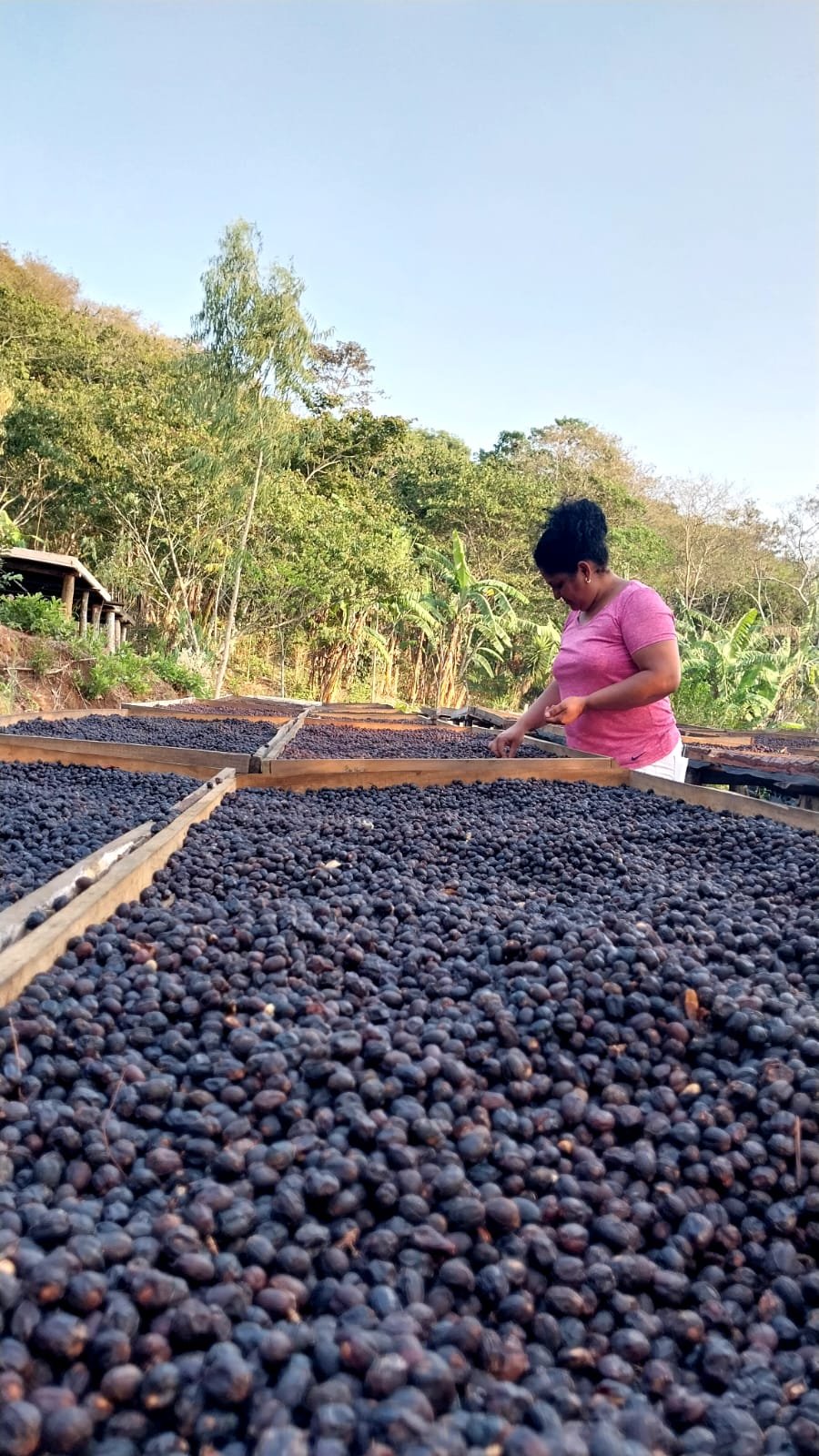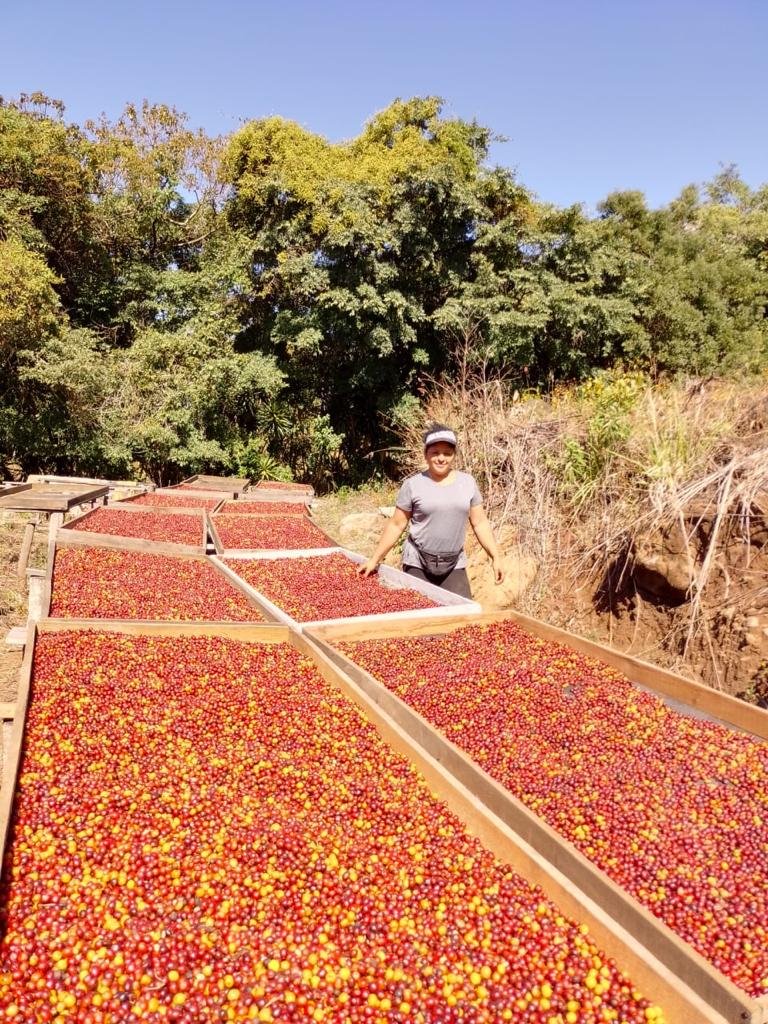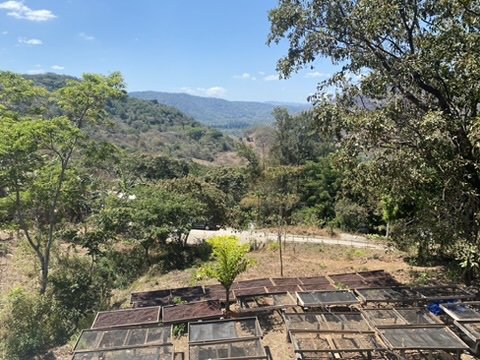 Image 1 of 4
Image 1 of 4

 Image 2 of 4
Image 2 of 4

 Image 3 of 4
Image 3 of 4

 Image 4 of 4
Image 4 of 4





La Nueva Montaña - Guatemala
Region: Fraijanes
Altitude: 1550 - 1800 masl
Process: Natural
Varietal: Catuai
We taste: Dark Chocolate, Golden Raisin, Red Apple
Antonio Gonzalez and Eby Aracely Samayoa at La Nueva Montaña
[Mil Gracias a Primavera Coffee for this information]
Antonio and Eby’s coffees are processed with utmost care and attention to detail at his mill, which is at 1200 meters - a bit lower than the farm where the plants grow, which means stronger sun and warmer days that are perfect for drying naturals. This year, with the weather a little cooler than usual, the mill’s location was key to ensuring good drying!
Only the ripest cherries are selected for this lot, and once the cherries are picked they are placed in clean, sealed plastic bags in the shade. Antonio knows that fermentation begins soon after the cherries are harvested, and years of experience have taught him that the best results come when this process is carefully controlled and as uniform as possible. He allows this coffee to stay in bags overnight for a short fermentation of no more than 14 hours, and then early the next morning the coffee is prepared for drying. Antonio soaks the cherries in water to remove any dust or floaters (immature or malformed beans). Soaking the cherries also serves to lower the microbial count and homogenize the temperature of the cherries. They are then placed on raised beds to dry for about 20 days. When on raised beds, the cherries need to be turned frequently in order to ensure thorough and even drying. The cherries are turned four times a day while they are drying at regular intervals. Milling the dried pods is the final step, which occurs at their dry mill in Fraijanes under the watchful eye of our experienced mill team. Then, the coffee is sorted, bagged, and prepared for export!
Antonio and Eby grow their coffee in the Fraijanes region of Guatemala, with an emphasis on natural process coffees dried on the hillside near their home. Antonio and Eby aren’t the only ones passionate about coffee, though. Their daughter Maria has decided to pursue a career as an agronomist, with a focus on preservation of the natural environment. On the farm, the family has put their values into practice with a worm composting project.
Producers know that they can spread dried coffee cherries on the coffee plants after the harvest as an inexpensive fertilizer containing nitrogen; however, Primavera Coffee encourages producers to use worm compost instead. Why? Worms eat coffee pulp, food scraps, and other organic waste, and they excrete a much more effective fertilizer rich in nitrogen, phosphorus, and potassium. This fertilizer is easy to extract without removing the worms themselves, who are left behind in their box to continue processing more material into compost. The liquid waste from the worms can be sprayed on the leaves of coffee plants as an additional foliar fertilizer. Antonio, Eby, and Maria have worked diligently to implement sustainable practices on the farm, and they have seen excellent results. Rich soils have helped them maintain a very high level of coffee quality on the farm, including small plots of exotic coffee varieties.
In the Cup
This coffee is a beautiful coffee with qualities that appeal to both classic coffee drinkers and those with more fruit forward tastes. When hot, the aromatics are sweet and berry-like. The first sip is full of fruit and sweetness with notes of golden raisin and stewed strawberry. The mouthfeel is silky with a dark chocolate finish. As it cools, this coffee becomes sweeter and develops a confectionary mouthfeel - giving it a rich and dessert-like quality. Overall this is a lovely, sweet, and delightful cup!
Region: Fraijanes
Altitude: 1550 - 1800 masl
Process: Natural
Varietal: Catuai
We taste: Dark Chocolate, Golden Raisin, Red Apple
Antonio Gonzalez and Eby Aracely Samayoa at La Nueva Montaña
[Mil Gracias a Primavera Coffee for this information]
Antonio and Eby’s coffees are processed with utmost care and attention to detail at his mill, which is at 1200 meters - a bit lower than the farm where the plants grow, which means stronger sun and warmer days that are perfect for drying naturals. This year, with the weather a little cooler than usual, the mill’s location was key to ensuring good drying!
Only the ripest cherries are selected for this lot, and once the cherries are picked they are placed in clean, sealed plastic bags in the shade. Antonio knows that fermentation begins soon after the cherries are harvested, and years of experience have taught him that the best results come when this process is carefully controlled and as uniform as possible. He allows this coffee to stay in bags overnight for a short fermentation of no more than 14 hours, and then early the next morning the coffee is prepared for drying. Antonio soaks the cherries in water to remove any dust or floaters (immature or malformed beans). Soaking the cherries also serves to lower the microbial count and homogenize the temperature of the cherries. They are then placed on raised beds to dry for about 20 days. When on raised beds, the cherries need to be turned frequently in order to ensure thorough and even drying. The cherries are turned four times a day while they are drying at regular intervals. Milling the dried pods is the final step, which occurs at their dry mill in Fraijanes under the watchful eye of our experienced mill team. Then, the coffee is sorted, bagged, and prepared for export!
Antonio and Eby grow their coffee in the Fraijanes region of Guatemala, with an emphasis on natural process coffees dried on the hillside near their home. Antonio and Eby aren’t the only ones passionate about coffee, though. Their daughter Maria has decided to pursue a career as an agronomist, with a focus on preservation of the natural environment. On the farm, the family has put their values into practice with a worm composting project.
Producers know that they can spread dried coffee cherries on the coffee plants after the harvest as an inexpensive fertilizer containing nitrogen; however, Primavera Coffee encourages producers to use worm compost instead. Why? Worms eat coffee pulp, food scraps, and other organic waste, and they excrete a much more effective fertilizer rich in nitrogen, phosphorus, and potassium. This fertilizer is easy to extract without removing the worms themselves, who are left behind in their box to continue processing more material into compost. The liquid waste from the worms can be sprayed on the leaves of coffee plants as an additional foliar fertilizer. Antonio, Eby, and Maria have worked diligently to implement sustainable practices on the farm, and they have seen excellent results. Rich soils have helped them maintain a very high level of coffee quality on the farm, including small plots of exotic coffee varieties.
In the Cup
This coffee is a beautiful coffee with qualities that appeal to both classic coffee drinkers and those with more fruit forward tastes. When hot, the aromatics are sweet and berry-like. The first sip is full of fruit and sweetness with notes of golden raisin and stewed strawberry. The mouthfeel is silky with a dark chocolate finish. As it cools, this coffee becomes sweeter and develops a confectionary mouthfeel - giving it a rich and dessert-like quality. Overall this is a lovely, sweet, and delightful cup!
Region: Fraijanes
Altitude: 1550 - 1800 masl
Process: Natural
Varietal: Catuai
We taste: Dark Chocolate, Golden Raisin, Red Apple
Antonio Gonzalez and Eby Aracely Samayoa at La Nueva Montaña
[Mil Gracias a Primavera Coffee for this information]
Antonio and Eby’s coffees are processed with utmost care and attention to detail at his mill, which is at 1200 meters - a bit lower than the farm where the plants grow, which means stronger sun and warmer days that are perfect for drying naturals. This year, with the weather a little cooler than usual, the mill’s location was key to ensuring good drying!
Only the ripest cherries are selected for this lot, and once the cherries are picked they are placed in clean, sealed plastic bags in the shade. Antonio knows that fermentation begins soon after the cherries are harvested, and years of experience have taught him that the best results come when this process is carefully controlled and as uniform as possible. He allows this coffee to stay in bags overnight for a short fermentation of no more than 14 hours, and then early the next morning the coffee is prepared for drying. Antonio soaks the cherries in water to remove any dust or floaters (immature or malformed beans). Soaking the cherries also serves to lower the microbial count and homogenize the temperature of the cherries. They are then placed on raised beds to dry for about 20 days. When on raised beds, the cherries need to be turned frequently in order to ensure thorough and even drying. The cherries are turned four times a day while they are drying at regular intervals. Milling the dried pods is the final step, which occurs at their dry mill in Fraijanes under the watchful eye of our experienced mill team. Then, the coffee is sorted, bagged, and prepared for export!
Antonio and Eby grow their coffee in the Fraijanes region of Guatemala, with an emphasis on natural process coffees dried on the hillside near their home. Antonio and Eby aren’t the only ones passionate about coffee, though. Their daughter Maria has decided to pursue a career as an agronomist, with a focus on preservation of the natural environment. On the farm, the family has put their values into practice with a worm composting project.
Producers know that they can spread dried coffee cherries on the coffee plants after the harvest as an inexpensive fertilizer containing nitrogen; however, Primavera Coffee encourages producers to use worm compost instead. Why? Worms eat coffee pulp, food scraps, and other organic waste, and they excrete a much more effective fertilizer rich in nitrogen, phosphorus, and potassium. This fertilizer is easy to extract without removing the worms themselves, who are left behind in their box to continue processing more material into compost. The liquid waste from the worms can be sprayed on the leaves of coffee plants as an additional foliar fertilizer. Antonio, Eby, and Maria have worked diligently to implement sustainable practices on the farm, and they have seen excellent results. Rich soils have helped them maintain a very high level of coffee quality on the farm, including small plots of exotic coffee varieties.
In the Cup
This coffee is a beautiful coffee with qualities that appeal to both classic coffee drinkers and those with more fruit forward tastes. When hot, the aromatics are sweet and berry-like. The first sip is full of fruit and sweetness with notes of golden raisin and stewed strawberry. The mouthfeel is silky with a dark chocolate finish. As it cools, this coffee becomes sweeter and develops a confectionary mouthfeel - giving it a rich and dessert-like quality. Overall this is a lovely, sweet, and delightful cup!
